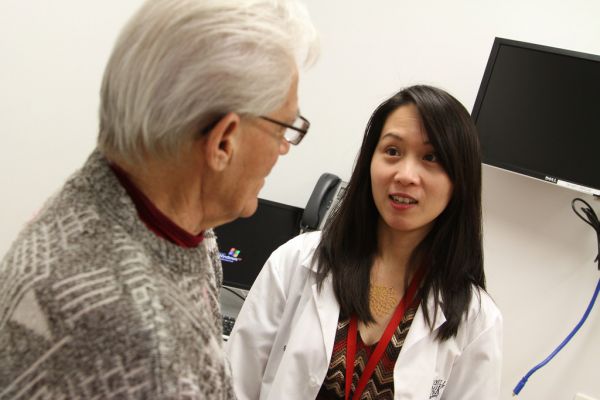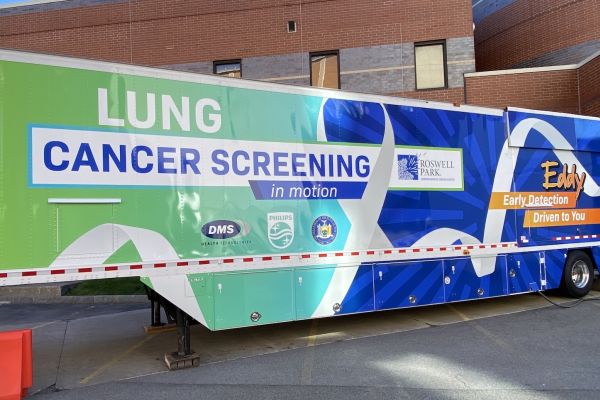Clinical trials at Roswell Park offered patients early access and led to FDA approval
An exciting area of cancer research is the discovery of a unique characteristic of a cancer cell, such as a gene mutation or other anomaly, that doesn’t exist in normal cells. When such mutations are discovered, scientists work to create a drug that can target the mutation (and thereby the cancer cell) and leave the normal cell alone.
Forty years ago, scientists discovered that many cases of non-small cell lung cancer (the most common type of lung cancer) had unique gene mutations called KRAS. Now, the only drug developed to target a specific alteration of the KRAS gene, which makes the growth of cancer cells more aggressive, is FDA approved.
"This is a significant breakthrough in fighting lung cancer,” says Grace Dy, MD, Chief of Thoracic Oncology at Roswell Park Comprehensive Cancer Center. “In our region, KRAS mutations are the most common oncogenic mutation among non-small cell lung cancers, and scientists have been trying to develop a drug against this for a long time.”
Because Roswell Park conducted some of the first clinical trials for the drug, called sotorasib, patients here have had early access to this novel targeted anticancer therapy for several years.
“The FDA approval provides patients with KRAS mutated lung cancer who are not eligible for clinical trials an important therapeutic option,” Roswell Park oncologist and scientist Edwin Yau, MD, PhD says.
Stopping the cancer cells from "dancing"
The new drug targets a specific type of KRAS mutation known as G12C, which represents about 13% of mutations in non-small cell lung cancers. Dr. Dy explains the KRAS G12C mutation results in molecules that are tightly partnered and frenetically “dance together,” causing cancer cells to replicate more rapidly. Sotorasib stops the “dance” by locking up arms with KRAS G12C, which renders it inactive, now unable to “dance” with its usual growth-signaling partner, she says.
Sotorasib, a pill, began testing in 2018. It was accelerated to early FDA approval in May 2021 after the multicenter phase I and phase II CodeBreak100 clinical trials determined it is effective in extending progression-free survival with a good quality of life in patients with non-small cell lung cancer positive for KRAS G12C.
Dr. Dy led the CodeBreak100 trial at Roswell Park and presented the results at the American Association for Cancer Research 2022 conference in New Orleans. “We were one of the first centers to have access to this new treatment,” she says. “Because of Roswell Park’s involvement, we were able to provide this breakthrough treatment option to patients early. We were part of the global team in generating data that led to the initial FDA approval.”
Why Roswell Park for lung cancer?
Our accomplished thoracic physicians are leaders in the field. Find out what else makes Roswell Park unique in diagnosing and treating lung cancer.
Learn MoreClinical trials provided early access to the drug
The final phase III trials both confirmed the effectiveness found in earlier trials and that the progression-free survival in patients who took sotorasib after standard of care treatment with chemotherapy (docetaxel) and/or immunotherapy was even better than patients who received standard of care alone. These data led to full FDA approval of the novel drug sotorasib under the trademark name Lumakras.
“Finally, after decades of attempts we have an effective therapy. But it’s a first-generation drug and there’s room to improve,” advises Dr. Dy.
She adds that other gene mutations, such as the STK11 alteration, also make KRAS-positive cancers more aggressive. Lung cancers with both KRAS and STK11 mutations do not generally respond well to chemotherapy and immunotherapy. However, sotorasib targeted therapy appears to work well, regardless of whether the STK11 gene mutation is present. At Roswell Park, multiple other scientists are investigating additional strategies to address these other genetic anomalies.
“People are already working on the next generation drugs that hopefully will be able to be more effective, and perhaps produce a longer response in combination with other treatments to improve efficacy, including drugs that can have activity against other types or even all types of KRAS mutations,” Dr. Dy says.
Because KRAS mutated lung cancer continues to be much more prevalent in the Roswell Park patient population in comparison to national averages, Roswell continues to be very active in clinical trials that target KRAS, adds Dr. Yau.
“We have a number of translational investigators studying KRAS mutant non-small lung cancer, including mechanisms of potential resistance to sotorasib and other cancer fighting drugs,” he says.



